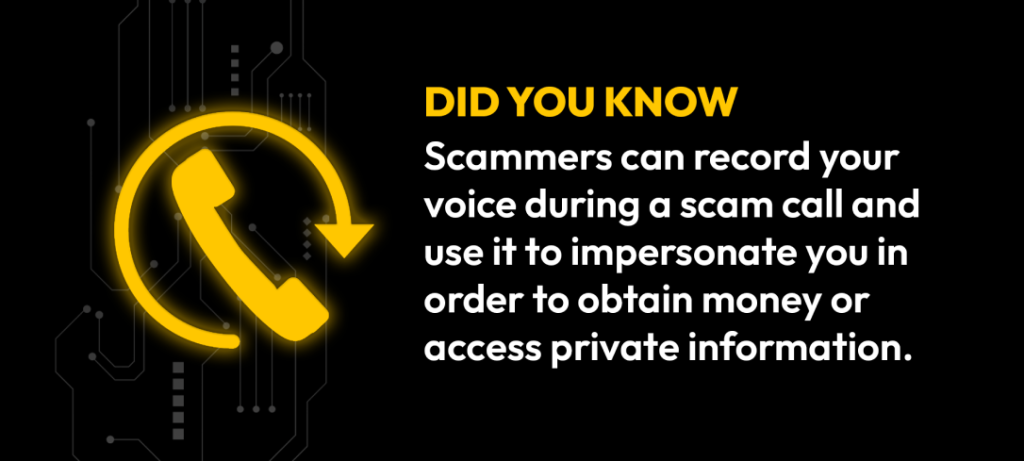Some benefits of using hardware security keys on iOS include protection against various cyber attacks, a smoother login experience and increased privacy. Since all mobile Apple
If you answer a spam call, you might start receiving more spam and scam calls, become a victim of SIM card swapping or get your phone number spoofed. Based on Truecaller’s findings, from July 2023 to July 2024, Americans collectively spent approximately 234,000,000 hours answering spam calls. While not every spam call is intended to deceive you like a scam call, receiving unwanted phone calls from persistent telemarketers can quickly become annoying.
Continue reading to learn if it’s bad to call back a spam number, what could happen and how to limit the number of spam calls you receive.
Is it bad to call back a spam number?
When you answer or call back a spam number, no immediate harm will be done to you, such as getting your phone hacked. However, calling back a spam number could result in receiving more spam calls and potentially becoming a target of scam calls, which carry much higher risks.
The difference between spam and scam calls
The main difference between spam calls and scam calls comes down to intentions. Spam calls are simply unwanted calls that may come directly from a business trying to sell you its product or service. Scam calls, however, are unwanted calls from an imposter posing as a legitimate person or company to trick you into sharing information or money. Think of spam calls as flies; you hear them buzzing constantly, and they grow agitating, but they won’t sting you. If spam calls are like flies, scam calls are like wasps with the potential to cause harm if you don’t steer clear of them.
What could happen if you call back a spam number?
If you call back a spam number, several things could happen. Let’s delve into some of the most common consequences of interacting with a spam number.
You could experience an increase in spam calls
One of the most frustrating outcomes of calling back a spam number is an influx of more spam calls. When you answer a call from a spam number, your phone number will appear to spammers as active, which means you will receive more unwanted calls since they know you are likely to answer.
You could be targeted with scam calls
After calling back a spam number, you may be targeted with scam calls because fraudsters will see that your number is active. If scammers think you will continue to answer unwanted calls, they also believe you might fall for their deceptions. To prevent putting any private information in the wrong hands, hang up immediately if you sense that a spam call is a scam call.
You could become a victim of AI voice scams

Some of the latest scam calls have relied on Artificial Intelligence (AI). By calling back a spam number, you could be targeted with scam calls and become a victim of AI voice scams. Scammers can record your voice during a scam call and use it to impersonate you in order to obtain money or access private information. They might even clone your voice using AI voice technology and call your loved ones, pretending that you are in danger and need money immediately.
You could have your SIM card swapped
If you’ve become a victim of AI voice scams, scammers could use your voice to impersonate you and convince your mobile carrier to activate a new SIM card in what is called SIM swapping. Although a scammer can’t physically replace the SIM card in your phone, they can pretend to be you and tell your mobile carrier that your phone was stolen or lost, which would require a new SIM card. Once a scammer has successfully activated a new SIM card on their phone by impersonating you, they will receive all your calls and texts. This could be especially dangerous if your bank calls, as the scammer would then have access to your financial information. Scammers could also receive any codes to change your passwords or authenticate an app or account after SIM swapping, allowing them to view emails, online accounts and more.
You could get your phone number spoofed
Because a scammer knows your phone number is legitimate after you’ve called a spam number back, they could spoof your phone number. Spoofing attacks over the phone trick people into thinking they are answering a familiar number. A scammer could use your phone number to scam other people by displaying your phone number as one their targets recognize. When they answer calls coming from your phone number, they believe they are answering a call from someone they know. If people believe this scam, scammers could receive private information by scamming other people using your phone number as a tool.
How to stop receiving spam calls
Although there are solutions to stop receiving spam calls, there is no way to stop receiving all spam calls, but rather, only reduce the amount of them. Here are our best tips to significantly reduce the number of spam calls you receive.
Ask your phone service provider if they offer a call-blocking service
Call-blocking services are used to prevent unsolicited calls from reaching your phone. It’s typically a feature that major phone service providers offer, allowing you to block numbers associated with scam calls, robocalls and telemarketing. If you use Verizon as your phone provider, Verizon blocks calls from spam numbers automatically. However, you can also download Call Filter for added protection, with monthly pricing based on your phone plan. Those who use AT&T can download ActiveArmor, which is an app that detects and blocks spam calls from reaching your phone. T-Mobile offers the Scam Shield app, which allows customers to block calls and texts from spam or scam numbers.
Check with your phone service provider to see what kinds of call-blocking services they offer. Otherwise, you can always block a spam number in your phone’s settings manually each time you receive one to ensure you never get another call from that number again.
Download a spam-filtering app
Although the major phone service providers mentioned above have their own apps and services for blocking spam, there are several apps you can download to filter spam, regardless of your provider. Truecaller has a spam-blocking app that can show you caller ID data immediately when you receive an incoming call, automatically block unwanted calls after finding them untrustworthy and offers many strong security features for free. Another spam-blocking app is Robokiller, which can identify telemarketing calls and answer those calls with a bot that both wastes spammers’ time and discourages them from calling back. Nomorobo has helped millions of people block spam calls by relying on a large database of telemarketing and robocalling numbers, so you will be able to prevent many spam calls from reaching your phone. These apps and many others can protect you from receiving an abundance of spam and potentially scam calls.
Sign up for the National Do Not Call Registry
The National Do Not Call Registry (DNC Registry) is a service that allows you to request that unwanted telemarketers do not call you. You can sign up for free by registering your home and/or cell phone number with the DNC Registry. Once you’ve registered your phone number(s), be aware that some organizations, including charities or political groups, may still call you. However, many companies are required by law to respect your request and will not call you. This will reduce the number of spam calls you receive, but it will not block all spam calls.
Avoid calling back spam numbers
If you receive a spam call, as a general practice, you should not have any reason to call them back. While spam calls may be annoying but harmless, they can lead to you becoming a target of scam calls and potentially identity theft. Avoid answering or calling back spam numbers to reduce the risks associated with scammers.

